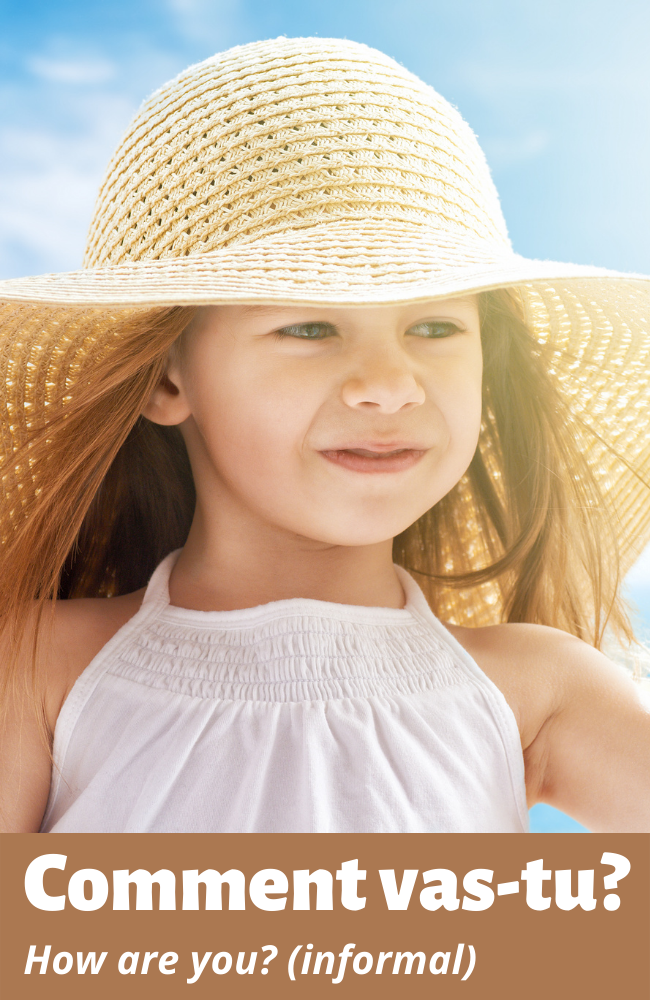In French, “How are you?” is: “Comment allez-vous?“ (formal and plural) and “Comment vas-tu?“ (singular and informal). However, there are many other ways to ask somebody how they’re doing. This post will explore all of these expressions in detail.

How do you say “How are you?” in French?
Usage of “aller” (to go) to express “How are you?” in French
The French language makes heavy use of the verb aller (to go) for many expressions related to “How are you?”. Before we go any further, we must look at aller in the tu (you singular, informal) and vous (you formal, plural) forms. We’ll need these verbs to ask, “How are you?”.
- tu vas you go (informal)
- vous allez you go (formal, plural)
The most common way to ask “How are you?” to somebody who you already know and with whom you’re familiar is the following:
- Comment vas-tu? How are you? (familiar)
You are literally asking, “How do you go?”. This is similar to the English expression, “How’s it going?”. If you don’t know the person, or you’re speaking to a group of people, you must use the following form:
- Comment allez-vous ? (How are you? formal and plural)

Aller bien
Another way to ask somebody how they’re doing is to use “aller bien” (to be doing fine or literally “going well”). Here’s how to ask:
- Tu vas bien ? Literally, “Are you doing fine?”
- Vous allez bien ? (same translation as above but to group or formal)
Using “ça va” to ask how are you
Another common and slightly less formal way of asking somebody how they’re doing is to use “ça va”. This expression translates literally to “that goes”. This page on our site offers a detailed explanation of the meaning and usage of “ça va“.
To ask somebody how they’re doing you can simply ask:
- Ça va ? How are you? / How’s it going?
You can also precede the expression by the word “comment“, which means “how?”.
- Comment ça va ? How’s it going?
More ways of asking how are you in French
In the following section we’ll look at a few more ways of asking somebody how they’re doing. These expressions are all considered slang and are used less often.
Ça roule?
“Ça roule ?” is a highly informal way of asking “How’s it going?” and translates literally to “that roles?”. English equivalents include expressions such as “How’s it hanging?” and “What’s up?”.
Quoi de neuf ?
“Quoi de neuf ?“ is a slang expression for asking “How are you” and translates literally to “What’s new?”. You can use this expression if you hadn’t seen somebody in a long time.
Quoi de beau ?
“Quoi de beau ?“ is yet another informal expression for “How are you?”. The literal translation of “Quoi de beau ?” is “What’s beautiful?”. The question is soliciting a positive response, meaning the other person is somehow expected to share the positive things going on in his or her life.
Ça baigne ?
“Ça baigne ?“ is a highly slang expression for “How are you?” and translates literally to “That bathes?” or “It bathes?”. This expression would definitely be off limits for people you don’t know!
Qu’est-ce que tu fais ?
The question, “Qu’est-ce que tu fais ?“ translates literally to “What are you doing? This is based on the verb faire, which means to make or do. This page on our site covers faire in detail. The meaning of this expression really is “What are you up to?” or “What have you been doing lately?”.
Qu’est-ce qui se passe ?
“Qu’est-ce qui se passe ?” translates to “What’s happening” or “What’s going on?”. You could use this expression to inquire about somebody’s current life or situation.
Comment te sens-tu ? / Comment vous sentez-vous ?
The question “Comment te sens-tu ?” translates to “How do you feel?” It is based on the verb se sentir, which means “to feel”. This expression would be very useful if you knew that the person you were asking had recently been ill or not well.
Qu’est-ce qui ne vas pas ?
The question “Qu’est-ce qui ne vas pas ?“ translates to “What’s wrong?”. This question is is using the verb “aller” (to go) in the negation. This page on our site covers the French negation rules.
Comment ça se passe?
“Comment ça se passe ?“ translates loosely to “How’s it going?”. The verb “se passer” means “to happen” or “to occur”. With this expression, what you’re really asking is, “how’s it going” with reference to a mutually understood ongoing situation. According to this thread on WordReference, this is a commonly used expression in French-speaking Canada.
Ça gaze?
“Ça gaze ?“ is yet another highly informal way of asking, “How’s it going?”. The literal translation is “That’s gassing?” Translations are also “How’s it hanging?” and “What’s up?”. You would definitely NOT use this expression in formal situations!
How are you in French – conclusion
Et voilà ! Now you have a much better grasp of how to ask, “How are you?” in French! Now check out our post covering how to say goodbye in French!

Discover more
- Bonjour meaning and usage
- Au revoir meaning and usage
- Ça va meaning and usage
- Guide to French greetings
- 20 ways to say “thank you”


